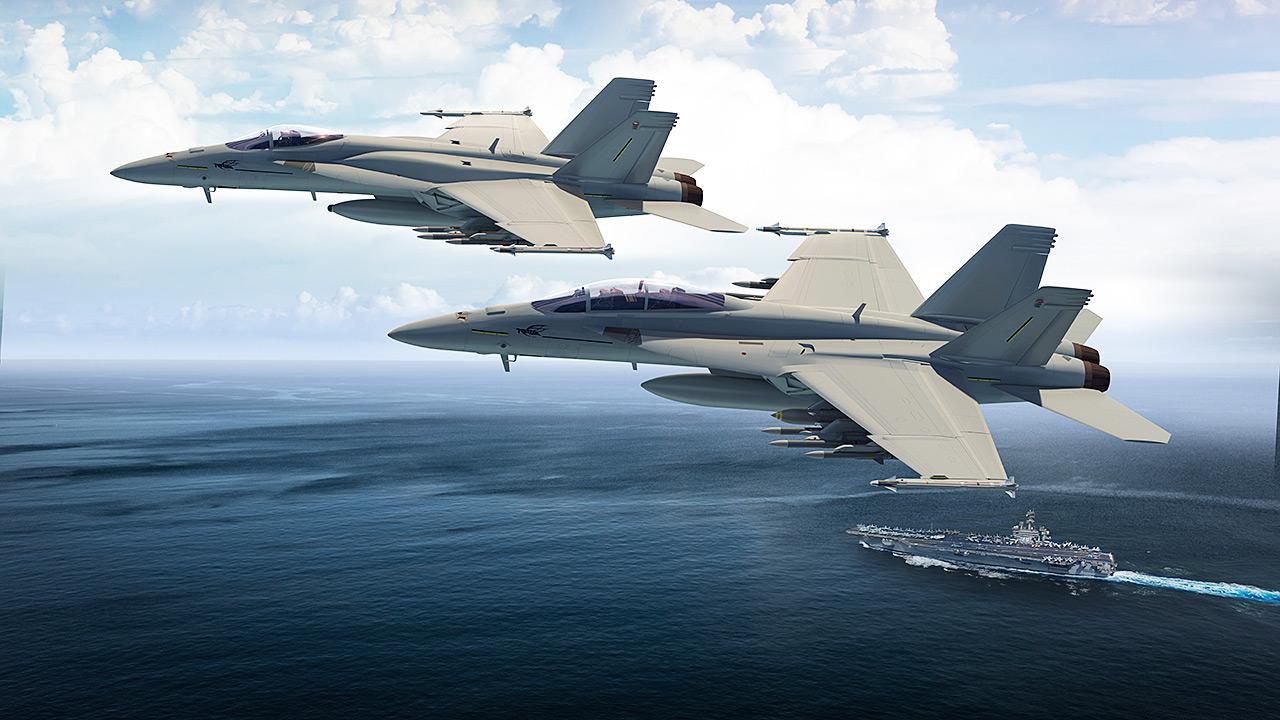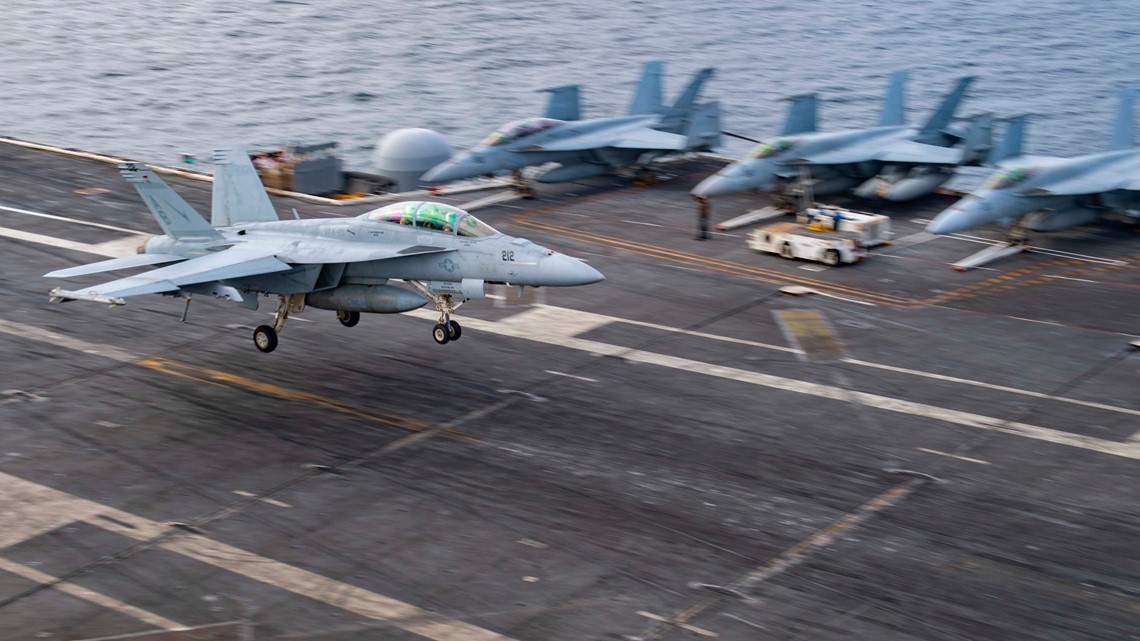It has been a tough few weeks for the U.S. military, with fighter jet crashes reported in recent times leading the U.S. Congress to mull tightening norms on aviation safety. However, the recent incident involving the F/A-18 Super Hornet ran into trouble while not in the air but while at sea, deployed onboard an aircraft carrier.
Ukraine ‘Tears Down’ Israel’s Iron Dome Systems; Says They Are Incapable Against Russian Missiles
Due to strong winds and heavy rain in the Mediterranean Sea on July 8, a Navy F/A-18 Super Hornet jet was “blown away” off the aircraft carrier Harry S. Truman, according to officials.
The accident took place when the aircraft was conducting an at-sea replenishment. The replenishment operations were immediately and safely stopped when the accident occurred.
“One sailor received minor injuries while conducting operations during the unexpected heavy weather,” the Italy-based U.S. 6th Fleet said in a statement. “The Sailor is in stable condition and expected to make a full recovery.”
The Super Hornet was a part of the USS Harry S. Truman’s Carrier Air Wing 1. The fleet informed that the carrier and its air wing remained functional.
Although the Sixth Fleet did not specifically state where the carrier was at the time of the incident, it was believed to be in the Mediterranean Sea. Truman and its strike group have been deployed to Europe since December and the last known location of the carrier was somewhere in the Mediterranean.

In January 2022, an F-35C, the carrier-variant of the fifth-generation fighter jet crashed in the South China Sea, while a British Royal Navy’s F-35B crashed in the Mediterranean in November 2021 shortly after it took off from the British HMS Elizabeth aircraft carrier, as previously reported by EurAsian Times.
The F/A-18 Super Hornet is a spectacular fighter jet with advanced aerial capabilities. This is the same aircraft that Hollywood heartthrob Tom Cruise was seen flying in the iconic Top Gun: Maverick, which left the audience worldwide awestruck with incredible aerial stunts and maneuvers.
Bad Time For Super Hornets?
On June 3, FA-18E Super Hornet crashed in the vicinity of Trona, killing the pilot Lt Richard Bullock. Trona is about 230 miles southeast of the fighter jet’s base at Naval Air Station Lemoore, California.
PICTURED: US Navy identifies pilot killed in crash during training mission in F-18 Super Hornet – the same plane Tom Cruise flies in Top Gun 2 – as investigators launch urgent probe https://t.co/YMZwgQcvYE pic.twitter.com/LB3gthzIxH
— Tande (@tanndde) June 6, 2022
A F/A-18F had crashed in Death Valley in October last year, injuring the pilot. In 2020, a F/A-18E crashed by a pilot’s fault in China lake, while another crash was reported in 2019 when a F/A-18E crashed on a training flight in Death Valley, killing the pilot.
This year, the summer has been particularly harsh on the U.S. services’ fighter jets. In the last two months, the military reported five major crashes, including the F-18 Super Hornets, two F-16s, MV-22 Osprey, and an MH-60S chopper.
To evaluate safety procedures and avoid any more crashes, the Navy went as far as temporarily suspending all aircraft operations last month. However, the recent incident involving the Super Hornet was the result of a severe storm unleashed by mother nature.
Top Gun Maverick F-18 Super Hornet scale Model by @shuichi_hayashi Yes! It’s a model ? #TopGunMaverick #Boeing #SuperHornet #TopGun #scalemodelling @NASFallonCSADD pic.twitter.com/WkH5oWKe1W
— chuppacabbra1971 (@chuppacabra1971) June 4, 2022
The recent aircraft carrier incident also comes at a time when the aircraft has hogged a lot of limelight with its enthralling flights in Top Gun.
The Indian Navy is also evaluating the Block III variant of the aircraft for its aircraft carrier Vikrant which has completed its last set of trials and is geared to be inducted into the Indian Navy. The carrier-borne fighter jet is competing against Rafale-Marines.

F/A-18 Super Hornets
The F/A-18E/F Super Hornet replaced the F-14 Tomcat from fleet duty in 1999. Air superiority, fighter escort, reconnaissance, aerial refueling, close air support, air defense suppression, and day/night precision attack are just a few of the many missions the F/A-18 aircraft excels at.
The F/A-18E and F/A-18F are intended to fulfill current Navy fighter escort and interdiction mission requirements, to maintain F/A-18 fleet air defense and close air support roles, as well as a growing number of missions, such as forward air controller (airborne) and aerial tanking, as they can take the place of the S-3 as an aerial tanker.

Increased range and better carrier adaptability are two F/A-18E/F upgrades necessary for the F/A-18 to continue playing its crucial strike fighter role against the sophisticated threats of the twenty-first century.
The F/A-18E/F Block III Super Hornet is a carrier-based fighter designed for high-load, high-stress operations. The aircraft extends the platform’s service life and range and incorporates an advanced cockpit system, reduced radar cross-section, and an advanced networking infrastructure.
- Contact the author at sakshi.tiwari9555@gmail.com
- Follow EurAsian Times on Google News




